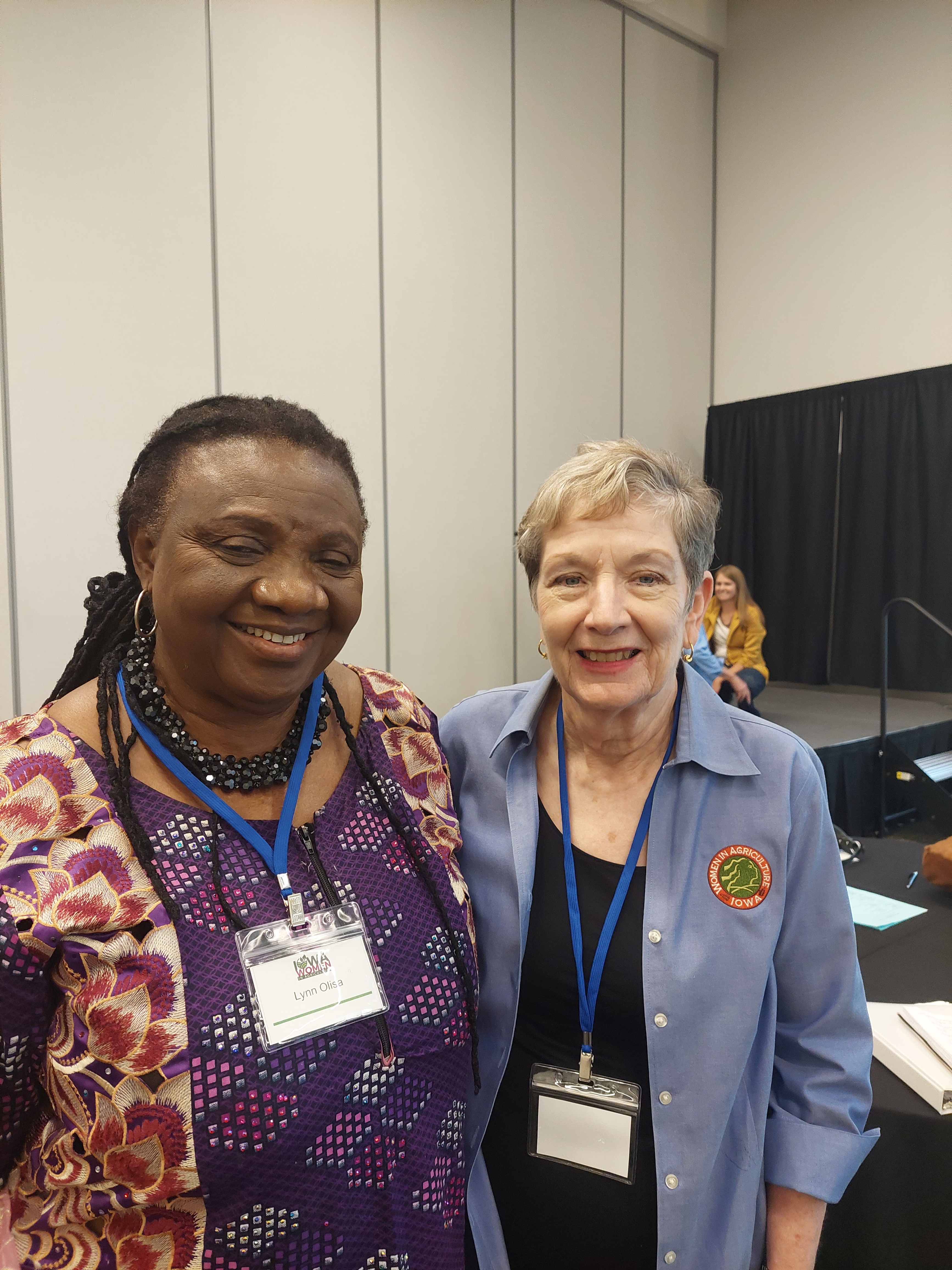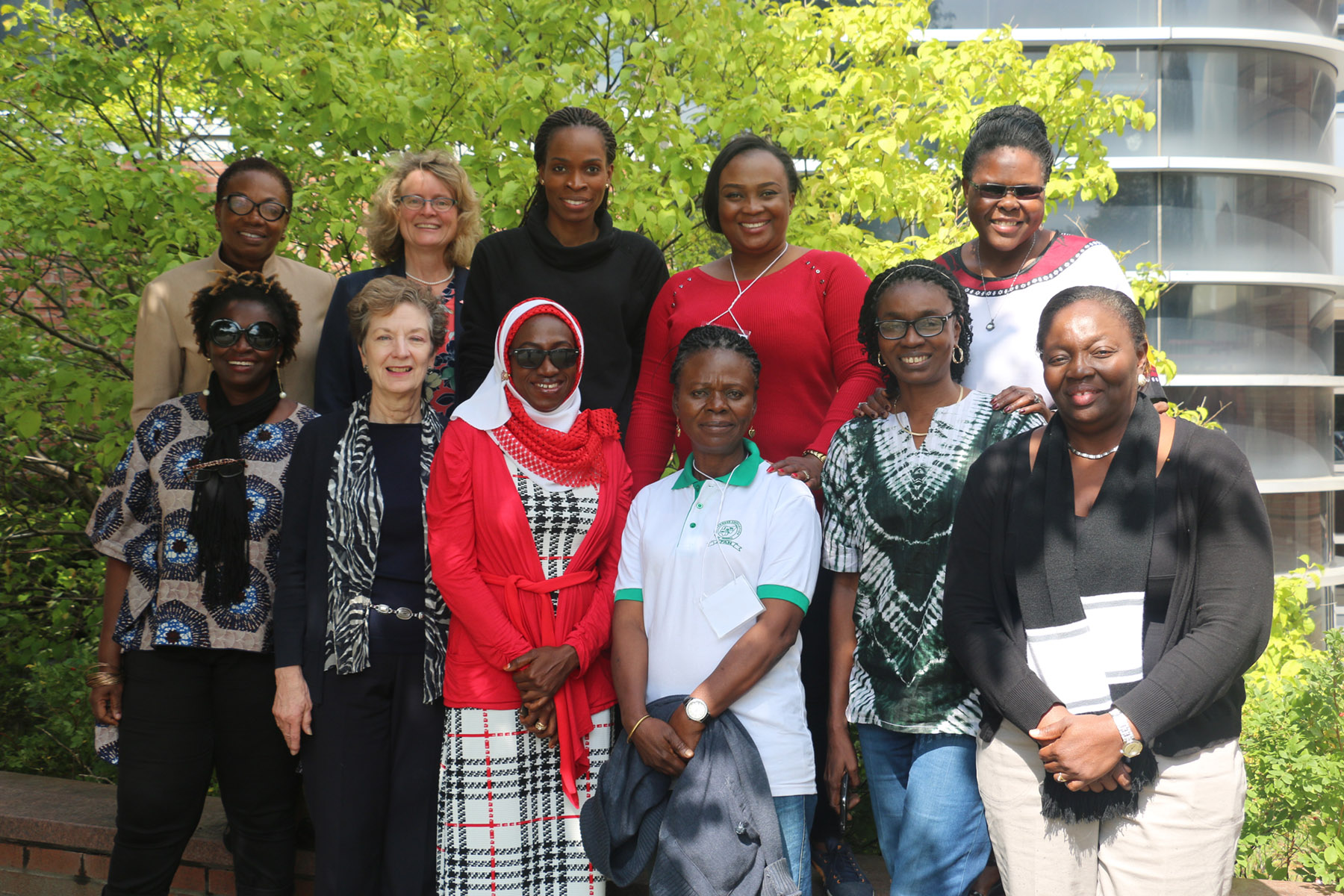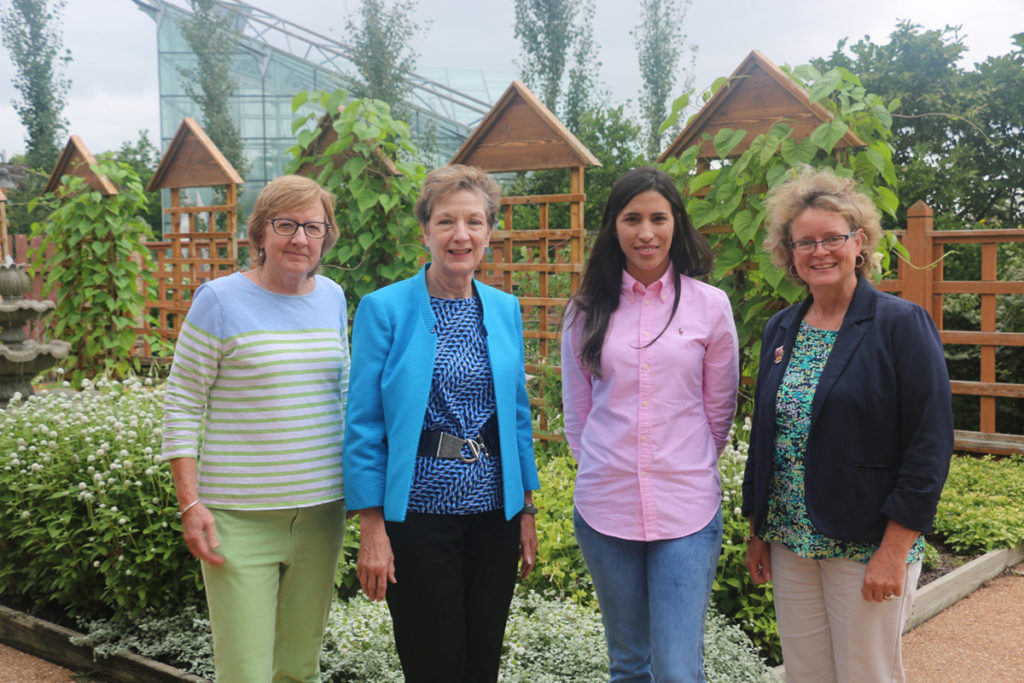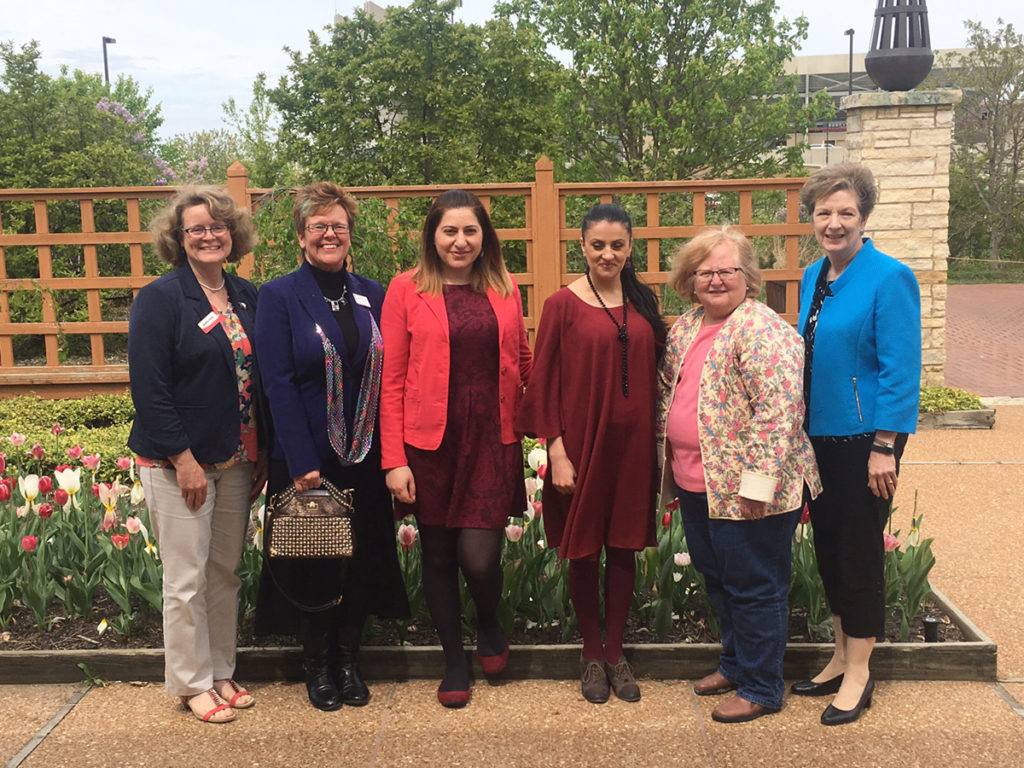Farmer-to-Farmer Introduction
You have to see it to be it!

Dr. Lynn Olisa and Cheryl Tevis at the 2023 IWIA Annual Conference
I met a woman this week who is on a mission, and I’d like you to know her, too.
The Iowa Women in Agriculture Conference at the FFA Enrichment Center in Ankeny attracts women from across the state, but it’s unusual when a woman travels 6,359 miles to attend.
Dr. Lynn Olisa from Abuja, Nigeria came for the first time last year. She stood up at the conference and told us that she wanted to bring other Nigerian women here in 2023. But we didn’t realize that she would be so determined.
This spring, she sent me an email, registering four other women and herself for the August 3 conference. Unfortunately, she contacted me again in late July, saying the four other women could not obtain a visa interview soon enough to arrive in Des Moines for our conference.
But Dr. Olisa was there, and this year I was able to learn more about why this 67-year-old woman is so passionate about women in agriculture. “I read about your conference on the internet,” she said. “I know Iowa is the place for agriculture. The first year I came to your conference, it opened my eyes.”
Olisa, who has a doctorate in public administration, grew up in Lagos, Nigeria, the former capital of Nigeria. Today she has the means to share her education and experience with farm women in her home country. “I’m educated, have my own money, and can talk,” she says.
But life wasn’t always so easy. Her husband died while their four children were young. “I had to work like hell to raise the children, and get my degree,” she said. In recent years, she’s become convinced that agriculture is the key to a better future for women – and for Nigeria. “I have a pig farm, goats, and two beef cows,” she said. “I grow rice seedlings and sell to middleman.” She hires women to help her care for the animals and grow the rice crop.
Working with a handful of other Nigerians, she helped create the Pathways Farmers Association. It’s just been registered by the Nigerian Corporate Affairs Commission as an (NGO) non-governmental organization. “We want to train and educate African women in better, sustainable farming, starting in my country,” she said. “We want to uplift and empower women. That is my challenge.”
U.S. women gained credit in 1974
Olisa’s goal of helping farm women to improve their lives resonates with me. As an editor at Successful Farming, I spent my early years there working with farm women to build their self-image and skill sets. “The most significant differences involve the roles of farm women,” I wrote in 1995. “With few exceptions the lives of farm women have changed as much in the past 25 years as farming itself. Much of the change can be attributed to the rise of modern appliances. But the women’s movement as well as the farm economy have played a role.”
Other story headlines followed: “Farm women flex financial muscle,” in 2004 and “New workshops help farm women hone business skills”; “The power of a farm woman,” in 2005. “This Land is Her Land” in 2012 and “Ag Women on the Grow” a few years later.
Covering the World Food Prize Borlaug Dialogue also underscored the critical role that women in agriculture play in less developed countries. In 1998, I wrote, “Women produce 50% of food grown in the world. Many women don’t have access to credit, farm inputs, research and new technology because they’re not classified as farmers. As women’s incomes grow, the money generally is spent on better food and water and safer housing for them and their children.”
In Nigeria, a country of over 200 million people, hunger and malnutrition are ubiquitous. Research shows that if women had the same access to productive resources as men, they’d increase the yields of farms by 20%-30% and reduce hunger by up to 17%. In addition, women invest their profits back into their households, helping to alleviate poverty from the bottom up.
Olisa confirmed to me that change has been slow to come. “If women farmers in Nigeria have a loving husband, it is better,” she said. “But some husbands take the money. Women do not have their own money or bank accounts. Women do all the farm work, but have no credit.” Nigerian women grow okra, melon, potatoes, bananas, and corn, and raise poultry. “Some have fishery, but too many dangers from mercury in the water,” she said.
Pathways Farmers Association is working to establish connections at Texas A & M, and in Georgia to help with business training. “If we can train women to produce better yields and expand land, they can contribute to the house, the society and community, and husbands value them more,” Olisa said. “Now, there’s only one, the husband, called the farmer.”
Cultural barriers for women
Olisa also is attempting to work for change by getting involved in Nigeria’s politics. She said Nigeria recently passed a law, The Violence Against Persons (Prohibition Act) to punish men who batter their wives. Widows also are especially vulnerable. The new law prevents in-laws from taking over the possession of property belonging to the late husband, as well as forced marriages between widows and their deceased husbands’ brothers. One of the discriminatory cultural practices outlawed is forcing a widow to drink the bath water of her deceased husband to prove her innocence of any allegation.
Legislation alone is not enough to change society’s views on women’s property rights. It can create hostility between men and women in such a patriarchal society. But achieving gender equality is crucial to reducing poverty and creating food security. Limiting women’s rights to land and other assets sabotages the potential to increase food production, reduce hunger, and limit malnutrition.
“I commend you,” Olisa told me and other farm women at our conference. “You are strong. I want the women to come back with me and see what happens with women in agriculture joined together. Women have their own associations in my country, but not farming. We want to teach them by training the trainer. So the chain continues.”
Olisa obviously believes in the words of tennis champion, Billie Jean King, “You have to see it to be it.”
Olisa said she wants to try again to bring women from Pathways Farmers Association to the Iowa Women in Agriculture Conference next August. “I need grants to help get them here,” she said.
Women are the workforce for food production, yet they have very little or no access to the very basic tools of food production. Closing the gender gap in agriculture supports women in their struggle to obtain the rights to land ownership and access to the right tools.
“Farming can grow a nation,” Olisa told me. Her plan is for Pathways Farmers Association to apply for farmland that can be allocated to Nigerian women to grow food. “It’s a big dream,” she said.
“Hold fast to dreams
for if dreams die
life is a broken-winged bird
that can not fly.
Hold fast to dreams
for when dreams go
life is a barren field
frozen with snow.”
Langston Hughes
September 9, 2017 at Iowa State University, Ames, Iowa

Pictured first row, second from left: Cheryl Tevis, president of Iowa Women in Agriculture
Top row, second from left: Madeline Schultz, Iowa State University Extension & Outreach, Women in Ag
Cheryl Tevis, Iowa Women in Agriculture president was invited by Iowa State University Women in Ag to participate in a September 9, 2017 program hosting eight Nigerian women visiting Iowa through the Cochran Fellowship Program. Dr. Ebby Luvaga obtained a grant to bring the women to Iowa. The Cochran Fellowship Program was created to give short-term training in the United States to agriculture professionals from foreign nations. The women had diverse backgrounds, ranging from raising livestock to rubber to architecture, and each arrived with specific goals.
Madeline Schultz, ISU Women in Ag Program Manager, presented the role of Annie’s Project to the women. In Nigeria, there are many mentor-based relationships among farm women, but research-based information is difficult to find.
Margaret Smith discussed online resources, and shared a record book copy that she created with a team in the Kamuli district of Uganda. Tracking financial inputs and production records from year-to-year gave the women documentation on harvest sums and the ability to gage real profits. One visitor pointed out, “When going to banks for loan or credit they ask for projections, but we have nothing to work with so this is good for me.” She planned to use and share her record book copy when she returned to Nigeria.
Cheryl Tevis, Iowa Women in Agriculture, highlighted the 2005 creation and subsequent growth of the organization. She explained how IWIA helps provide information and resources to women farmers, landowners, and agribusiness professionals to grow their expertise, skills, and knowledge and expand their networks so they can achieve their financial potential and contribute to the agricultural community.
The Nigerian women spent two weeks in Iowa, visiting farms, the Landus Cooperative board, Cargill, and many other locations. The women agreed that the biggest difference between U.S. ag and Nigerian ag is mechanization. Historically, the U.S. adopted technology quickly because of the cost and availability of labor; Nigeria’s higher population encourages reliance on manual labor.
Nigerian women play a major role in managing farm labor and day-to-day activities, and the women enjoyed comparing and contrasting gender roles in both countries. “Women’s roles [in agriculture] in Nigeria are more pronounced than Iowa,” Dr. Luvaga observed.
The eight women returned to Nigeria with the goal of using the information and skills gained to aid local business development and capacity building by increasing the profitability of small businesses and discovering better ways to form business plans. Others focused on improved soybean processing equipment resources and working with women scientists to discover new more profitable strategies in ag.
The visit helped the women learn how to improve their communication skills and obtain relevant topics for training farmers. They returned home motivated to build and grow women’s groups in Nigeria.

Pictured left to right: Debra Lightner, Cheryl Tevis, Daiana Coimbra and Madeline Schultz.
August 20, 2018 at Reiman Gardens, Ames, Iowa
This group of Iowa Women in Agriculture board members met with Daiana Coimbra at Reiman Gardens in Ames on August 20. Daiana is an agronomist and business owner from Brazil who visited Iowa in August.

Left to right: Madeline Schultz, Debra Schuler, Irina Yolyan, Anna Aleksanyan, Cathy Ayers and Cheryl Tevis Visit with Armenian Women
May 3, 2017 at Reiman Gardens, Ames, Iowa
Dave and Melanie Perry from Ankeny, IA developed an ongoing effort to support the Women’s Development Resource Center Foundation that was established in 2008 in Goris, Armenia. The center is now part of a network of several similar centers in Armenia. The Perrys are hosting two women from Armenia this month, Anna Aleksanyan, a program manager, and Irina Yolyan, a TV journalist. Dave invited us to visit with the women to share about each other’s activities.
The Women’s Center focuses on 1) women’s economic empowerment, 2) community engagement, 3) combating domestic violence, and 4) women’s political empowerment.
Cathy, Lori, Deb, Madeline, and Cheryl were able to visit with Dave, Anna and Irina.
Dave provided background on he and his wife’s work with the Women’s Resource Center (WRC). There are 45 US states that recognize the 1915 Armenia Genocide carried out by the Ottoman Empire. About 1.5 million Armenians lost their lives. Even with this loss, today the country’s population is 97% Armenian. Dave is working with Gov. Branstad to see if Iowa can become the 46th state to recognize the genocide. Anna and Irina visited Gov. Branstad and Lt. Gov. Reynolds. (See ‘The Promise’ movie review.)
The two women attended the Iowa Women Lead Change conference last week. They enjoyed the inspiring personal stories. (See the recap.)
Irina has a BS in Elementary Education. She works as a regional news broadcaster. She says the status of rural women is a concern, as they are often looked down on. Rural homes and schools are poor. The country is mountainous; the people are religious and generally good natured.
Anna explained Armenia is a very agriculture oriented country about the same size as Iowa. They produce many dried fruits, vegetables and wines and do not rely on GMO’s, heavy machinery, or chemicals. Women do the hard work of farming. Most farms are small. Many men, especially educated men, leave Armenia to go to work in other countries. They often send money home. However, many children are being raised without a father present and homes are often multi-generational.
The WRC helps women earn money for their household by marketing the handi-crafts they produce. (See Goris Handmade on FaceBook.) They also provide business training classes. There is a huge need for lending or mico-loans, but women do not have that opportunity at this time.
Cheryl gave an overview of the IWIA organization. It is a way for women to support each other and gain information to help them with farm business decision making and improve their understanding of agriculture. Madeline showed our guests the five minute video of Cathy Ayers talking about how she is managing her farm to improve soil and water quality. (View here.) Madeline explained how Annie’s Project courses teach women about financial, human resources, legal, marketing and production risks and shared how we are working to support women farmers and women in agribusiness.
